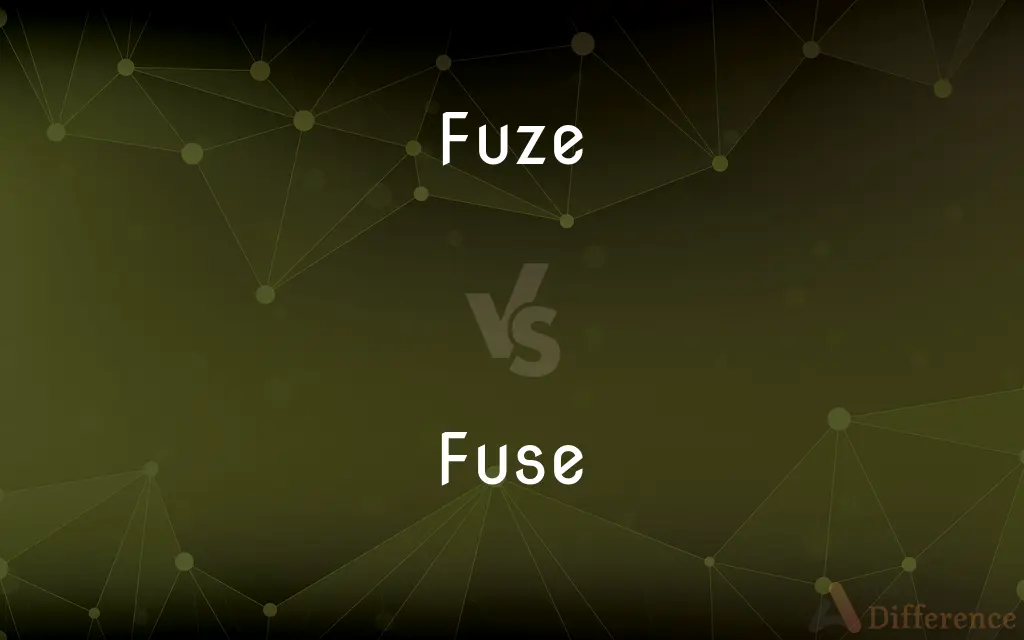Fuze vs. Fuse — What's the Difference?
By Maham Liaqat & Fiza Rafique — Updated on March 31, 2024
Fuze refers to a device for detonating explosives, with a focus on military and industrial uses, while fuse is a safety device designed to protect electrical circuits from overload by melting when the current is too high.

Difference Between Fuze and Fuse
Table of Contents
ADVERTISEMENT
Key Differences
A fuze is a mechanism used to initiate the detonation of an explosive device, such as bombs, shells, and mines, often incorporating timing, proximity, or impact mechanisms to control when and how the explosive is activated. This term is primarily used in military and industrial contexts, where precision in the timing and method of detonation is crucial. On the other hand, a fuse is an electrical safety device that interrupts the flow of excessive electric current to prevent damage to appliances or electrical fires. It contains a metal wire or strip that melts when too much current flows through it, thereby breaking the circuit.
Fuzes are designed to trigger an explosive effect at a specific moment or under certain conditions, playing a critical role in the effectiveness and safety of military operations and controlled demolitions. They can be complex, incorporating mechanical and electronic components to achieve the desired timing and triggering mechanisms. In contrast, fuses are simpler devices focused on safety. They are a critical component in household and industrial electrical systems, designed to be the weak link in the circuit that fails safely under overload conditions.
The development and application of fuzes require detailed knowledge of explosives and detonation mechanisms, reflecting their specialized use in contexts where timing and control over explosions are paramount. Conversely, fuses are widely used and understood, forming an essential part of electrical safety in everyday life. Their design and operation principles are straightforward, emphasizing reliability and the prevention of electrical overloads.
While the primary function of a fuze is to control the detonation of explosives, a fuse’s function is protective, designed to sacrifice itself to save other components or systems from damage. This difference underscores the distinct roles each plays—fuzes in controlling explosive forces for military and industrial purposes, and fuses in protecting electrical circuits and equipment from damage due to overcurrent.
Though fuze and fuse might sound similar and share origins in the concept of igniting or triggering a reaction, their modern uses are distinct. Fuzes are integral to the controlled initiation of explosives, while fuses are fundamental to electrical safety, preventing harm and damage by breaking circuits under overload conditions.
ADVERTISEMENT
Comparison Chart
Definition
A device for detonating explosives
A safety device for protecting electrical circuits
Primary Use
Military and industrial explosives
Electrical systems
Operation
Initiates an explosion
Interrupts excessive current flow
Components
May include timing mechanisms, sensors, and detonators
Contains a metal wire or strip that melts
Key Function
Control over detonation
Prevention of electrical overload and damage
Compare with Definitions
Fuze
A mechanism designed to detonate an explosive at a precise moment.
The artillery shell was equipped with a proximity fuze to detonate above the target.
Fuse
Contains a metal wire that melts to break the circuit.
Replacing a blown fuse restores the electrical circuit's functionality.
Fuze
Used in military and controlled demolition applications.
The demolition crew set up a fuze for the controlled explosion of the old building.
Fuse
A safety device that protects circuits from overcurrent by melting.
The fuse blew when the circuit was overloaded, preventing damage.
Fuze
Can be designed to react to impact, proximity, or time.
Impact fuzes detonate upon hitting the target.
Fuse
Designed to be the weakest link in an electrical circuit.
The fuse is designed to fail safely under excessive current conditions.
Fuze
Critical for the safety and effectiveness of explosive devices.
The reliability of a fuze is crucial for the mission's success.
Fuse
Essential for household and industrial electrical safety.
The building's electrical system was equipped with fuses for each circuit.
Fuze
Incorporates timing and sensing components for accurate detonation.
Modern fuzes use sophisticated electronics to improve accuracy.
Fuse
Prevents electrical fires and damage to appliances.
A properly rated fuse can prevent costly damage to sensitive equipment.
Fuze
In military munitions, a fuze (sometimes fuse) is the part of the device that initiates function. In some applications, such as torpedoes, a fuze may be identified by function as the exploder.
Fuse
A cord of readily combustible material that is lighted at one end to carry a flame along its length to detonate an explosive at the other end.
Fuze
Variant of fuse1.
Fuse
Often fuze A mechanical or electrical mechanism used to detonate an explosive charge or device such as a bomb or grenade
"A mechanical ... switch is used to initiate the fuzes" (International Defense Review).
Fuze
An auxiliary device with explosive components, used to detonate a munition.
Fuse
A safety device that protects an electric circuit from excessive current, consisting of or containing a metal element that melts when current exceeds a specific amperage, thereby opening the circuit.
Fuze
To equip with a fuze.
Fuse
To equip with a mechanical or electrical fuse.
Fuze
Any igniter that is used to initiate the burning of a propellant
Fuse
To join (different pieces or elements) together physically, as by melting or heating
Bits of glass fused in a kiln.
Atomic nuclei that are fused together inside the stars.
Fuse
To blend or combine together
"Edison's invention strategy effectively fused research and development in a seamless process" (Seth Shulman).
Fuse
To liquefy or reduce to a plastic state by heating; melt.
Fuse
To become physically joined together, as by melting.
Fuse
To be combined or blended together
"There was no separation between joy and sorrow.
Fuse
To become liquefied from heat.
Fuse
A cord that, when lit, conveys the fire to some explosive device.
Fuse
The mechanism that ignites the charge in an explosive device; a detonator.
Fuse
(figurative) A tendency to lose one's temper.
When talking about being laid off, he has a short fuse.
Fuse
A friction match for smokers' use, having a bulbous head which when ignited is not easily blown out even in a gale of wind.
Fuse
A kind of match made of paper impregnated with niter and having the usual igniting tip.
Fuse
(electrical engineering) A device to prevent excessive overcurrent from overload or short circuit in an electrical circuit, containing a component that melts and interrupts the current when too high a load is passed through it.
Fuse
To furnish with or install a fuse to (an explosive device) Usage notes]] for noun above.
Fuse
(transitive) To liquify by heat; melt.
Fuse
(transitive) To melt together; to blend; to mix indistinguishably.
Fuse
(intransitive) To melt together.
Fuse
To furnish with or install a fuse to protect a circuit against overcurrent.
Fuse
To have been protected against overcurrent by its fuse melting away, creating a gap in the wire, thus stopping the circuit from operating.
When the bath overflowed, the downstairs lights fused, so we need a torch.
Fuse
(organic chemistry) To form a bicyclic compound from two similar or different types of ring such that two or more atoms are shared between the resulting rings
Fuse
To liquefy by heat; to render fluid; to dissolve; to melt.
Fuse
To unite or blend, as if melted together.
Whose fancy fuses old and new.
Fuse
To be reduced from a solid to a fluid state by heat; to be melted; to melt.
Fuse
To be blended, as if melted together.
Fuse
A tube or casing filled with combustible matter, by means of which a charge of powder is ignited, as in blasting; - called also fuzee. See Fuze.
Fuse
A mechanism in a bomb, torpedo, rocket, or artillery shell, usually having an easily detonated explosive charge and activated by the shock of impact, which detonates the main explosive charge. Some fuses may have timing mechanisms, delaying the explosion for a short time, or up to several days after impact. Fuses activated by other mechanisms more sophisticated than impact, such as proximity or heat, are used in modern weapons such as antiaircraft or antimissile missiles.
Fuse
A wire, bar, or strip of fusible metal inserted for safety in an electric circuit. When the current increases beyond a certain safe strength, the metal melts, interrupting the circuit and thereby preventing possibility of damage. It serves the same function as a circuit breaker.
Fuse
Electrical device that can interrupt the flow of electrical current when it is overloaded
Fuse
Any igniter that is used to initiate the burning of a propellant
Fuse
Mix together different elements;
The colors blend well
Fuse
Become plastic or fluid or liquefied from heat;
The substances fused at a very high temperature
Fuse
Equip with a fuse; provide with a fuse
Fuse
Make liquid or plastic by heating;
The storm fused the electric mains
Common Curiosities
What is the main difference between a fuze and a fuse?
A fuze is a device used to initiate the detonation of explosives, while a fuse is a safety device designed to protect electrical circuits from overload.
Can a blown fuse be reused?
No, once a fuse has blown (melted), it must be replaced with a new one of the correct rating for the circuit.
Are there different types of fuzes?
Yes, there are various types of fuzes, including impact, time-delay, proximity, and electronic fuzes, each designed for specific detonation conditions.
How does a fuse prevent electrical fires?
A fuse prevents electrical fires by melting and interrupting the circuit when the current exceeds safe levels, thereby stopping the flow of electricity.
Why is the reliability of a fuze important in military operations?
The reliability of a fuze is crucial in military operations to ensure that explosives detonate as intended, which is vital for the success of the operation and the safety of personnel.
How do I know if a fuse is blown in my home electrical system?
A blown fuse is typically indicated by a loss of power to appliances or lights on the circuit it protects. The metal wire inside the fuse will also be visibly broken or melted.
Can fuzes be electronically controlled?
Yes, many modern fuzes incorporate electronic components for more precise control over detonation timing and conditions.
What safety precautions are necessary when replacing a fuse?
When replacing a fuse, it's important to turn off the power to the circuit, verify the correct fuse rating, and handle the fuse and fuse box safely to avoid electrical shock.
Can a fuze be used in non-military applications?
Yes, fuzes can also be used in industrial applications, such as controlled demolitions and fireworks.
How do fuzes contribute to the effectiveness of a military operation?
Fuzes contribute to the effectiveness of military operations by ensuring that explosives detonate at the optimal time and place to achieve the intended strategic or tactical objective.
Share Your Discovery

Previous Comparison
Tenacity vs. Resilience
Next Comparison
Tole vs. TollAuthor Spotlight
Written by
Maham LiaqatCo-written by
Fiza RafiqueFiza Rafique is a skilled content writer at AskDifference.com, where she meticulously refines and enhances written pieces. Drawing from her vast editorial expertise, Fiza ensures clarity, accuracy, and precision in every article. Passionate about language, she continually seeks to elevate the quality of content for readers worldwide.














































